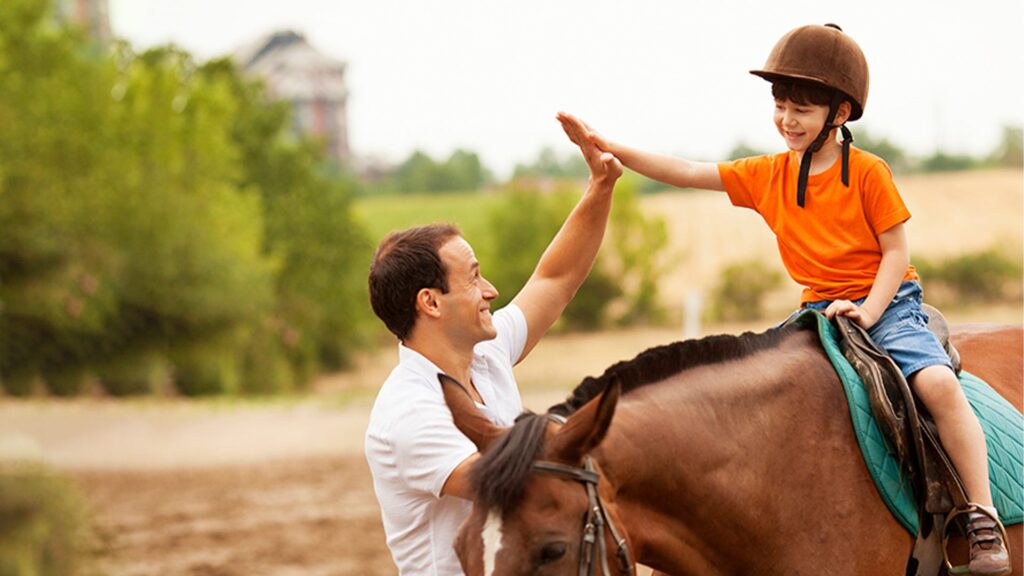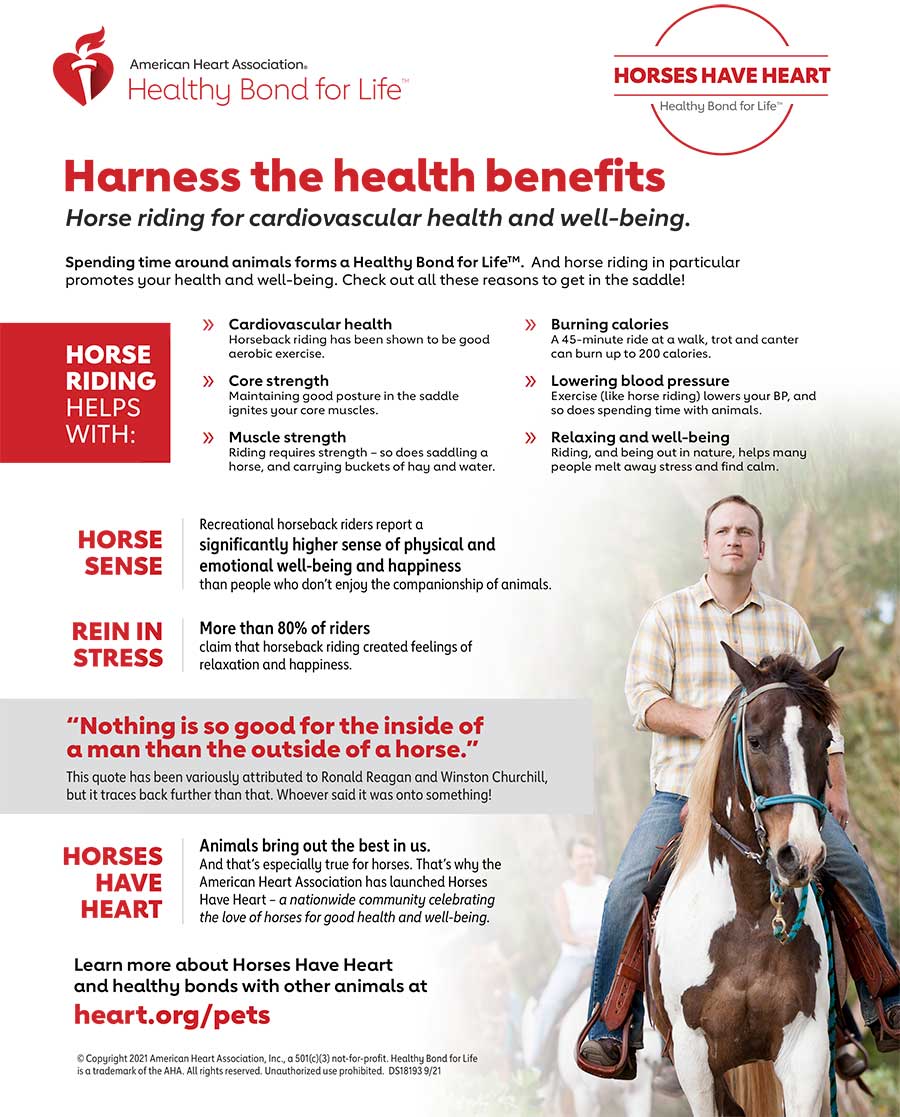Discover the incredible benefits of horseback riding for emotional well-being. Horseback riding is not only a fun and exciting activity, but it also has numerous positive effects on your mental health. Whether you’re a beginner or an experienced rider, the connection between horse and rider can provide a sense of peace, relaxation, and emotional healing. In this article, we’ll explore how horseback riding can improve your emotional well-being, reduce stress, boost self-confidence, and increase overall happiness. So saddle up and get ready to embark on a journey of self-discovery and emotional rejuvenation through the power of horseback riding.
1. Physical Benefits of Horseback Riding
Horseback riding is not only a fun and enjoyable activity, but it also offers numerous physical benefits. Let’s take a look at some of the ways horseback riding can improve your physical well-being.
1.1 Increases Balance and Coordination
When you ride a horse, you constantly have to adjust your balance and coordinate your movements with the horse’s rhythm. This helps to improve your overall balance and coordination skills. As you become more experienced, you’ll find it easier to maintain your balance in and out of the saddle.
1.2 Builds Core Strength
Riding a horse requires engaging your core muscles to maintain stability and balance. The constant movement of the horse’s gait activates your core muscles, helping to strengthen your abdominal and back muscles. By regularly riding, you can develop a strong and stable core.
1.3 Improves Cardiovascular Health
Horseback riding is an activity that can get your heart rate up and provide a cardiovascular workout. When you ride, your body is continuously working to adjust to the horse’s movements, which helps to improve your cardiovascular fitness over time. This can lead to a healthier heart and improved overall cardiovascular health.
1.4 Enhances Flexibility and Range of Motion
As you ride a horse, you move through different positions, such as rising trot and two-point position. These movements require flexibility and a wide range of motion in your hips, knees, and ankles. Regular horseback riding can help to improve your flexibility and increase your range of motion in these areas.
1.5 Boosts Endurance and Stamina
Horseback riding can be a physically demanding activity, especially for those who participate in longer rides or engage in activities such as jumping or endurance riding. By consistently riding and challenging yourself, you can increase your endurance and stamina. This means you’ll be able to ride for longer periods of time without feeling tired or fatigued.
2. Emotional Benefits of Horseback Riding
Aside from the physical benefits, horseback riding can also greatly impact your emotional well-being. Here are some of the ways that horseback riding can improve your mood and provide emotional benefits.
2.1 Reduces Stress and Anxiety
One of the remarkable benefits of horseback riding is its ability to reduce stress and anxiety. Spending time with horses and engaging in the rhythmic motion of riding can have a calming effect on your mind and body. The connection and bond you develop with the horse can create a sense of peace and tranquility, helping to alleviate stress and anxiety.
2.2 Enhances Mood and Happiness
Interacting with horses and engaging in horseback riding can release endorphins, which are known as “feel-good” hormones. These endorphins can boost your mood and increase feelings of happiness and well-being. The joy and sense of accomplishment you experience while riding can have a positive impact on your overall mood and emotional state.
2.3 Provides a Sense of Achievement
Mastering the skills required for horseback riding can provide a great sense of achievement. As you progress in your riding abilities, whether it’s learning to trot or mastering more advanced maneuvers, you’ll feel a sense of pride and accomplishment. This can greatly boost your self-esteem and provide a positive outlook on life.
2.4 Boosts Self-Confidence and Self-Esteem
Horseback riding requires you to take charge and communicate effectively with the horse. As you develop your skills and form a bond with your horse, your self-confidence and self-esteem can greatly improve. The ability to control such a powerful and majestic animal can give you a sense of empowerment and boost your overall self-confidence.
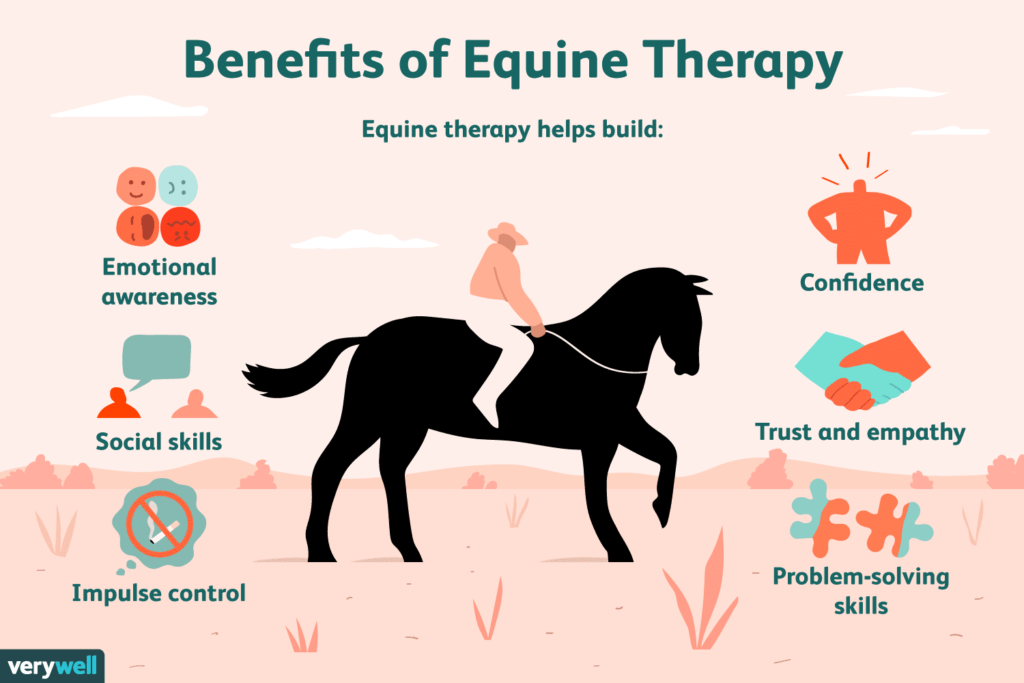
3. Psychological Benefits of Horseback Riding
Horseback riding not only has physical and emotional benefits but also has several psychological advantages. Let’s explore some of the ways horseback riding can positively impact your mental well-being.
3.1 Improves Focus and Concentration
When you ride a horse, you need to be fully present and focused. You have to pay attention to your body position, the horse’s movements, and your surroundings. This constant engagement and focus can improve your ability to concentrate and stay present in the moment. As a result, riding can help sharpen your focus and enhance your mental clarity.
3.2 Promotes Mindfulness and Mind-Body Connection
Horseback riding is a mindful activity that encourages you to be fully present and aware of your body and surroundings. It requires you to connect with the horse and tune into its subtle cues and movements. This can help you develop a greater sense of mindfulness and cultivate a deeper mind-body connection.
3.3 Increases Relaxation and Decreases Depression
The rhythmic motion of riding can have a relaxing and therapeutic effect on your mind and body. It provides a break from the demands and stressors of daily life, allowing you to relax and unwind. Engaging in horseback riding regularly can help to reduce symptoms of depression and promote a more positive and balanced mental state.
3.4 Fosters Social Connections and Trust
Horseback riding often involves interacting with other riders, instructors, and equestrian professionals. This can provide opportunities to build social connections and form new friendships within the horseback riding community. Additionally, working with horses requires establishing trust and effective communication, fostering important social and relational skills.
4. Therapeutic Benefits of Horseback Riding
Horseback riding has been recognized as a valuable therapeutic tool for individuals with various physical, cognitive, and emotional conditions. Let’s explore some specific therapeutic benefits of horseback riding.
4.1 Equine-Assisted Therapy for Trauma and PTSD
Equine-assisted therapy, also known as horse therapy or equine therapy, has shown promising results in helping individuals who have experienced trauma or suffer from post-traumatic stress disorder (PTSD). The presence of horses and the sensory experience of riding can provide a safe and calming environment for individuals to process their emotions and work towards healing.
4.2 Hippotherapy for Individuals with Disabilities
Hippotherapy involves using horseback riding as a therapeutic intervention for individuals with physical or developmental disabilities. The movement of the horse stimulates the nervous system, helping to improve posture, balance, and coordination. Hippotherapy can be particularly beneficial for individuals with conditions such as cerebral palsy, autism, and Down syndrome.
4.3 Therapeutic Riding for Cognitive and Emotional Disorders
Therapeutic riding programs cater to individuals with cognitive and emotional disorders such as ADHD, anxiety, and depression. Horseback riding, combined with structured activities tailored to specific needs, can help improve cognitive functioning, emotional regulation, and overall well-being. It provides a unique and engaging form of therapy that offers both physical and psychological benefits.
4.4 Emotional Regulation and Sensory Integration
Riding a horse stimulates multiple senses and can provide sensory integration for individuals with sensory processing disorders. The rhythmic motion of the horse’s gait, the touch of its coat, and the various sensory experiences during the ride can help individuals regulate their emotions and improve sensory processing abilities.
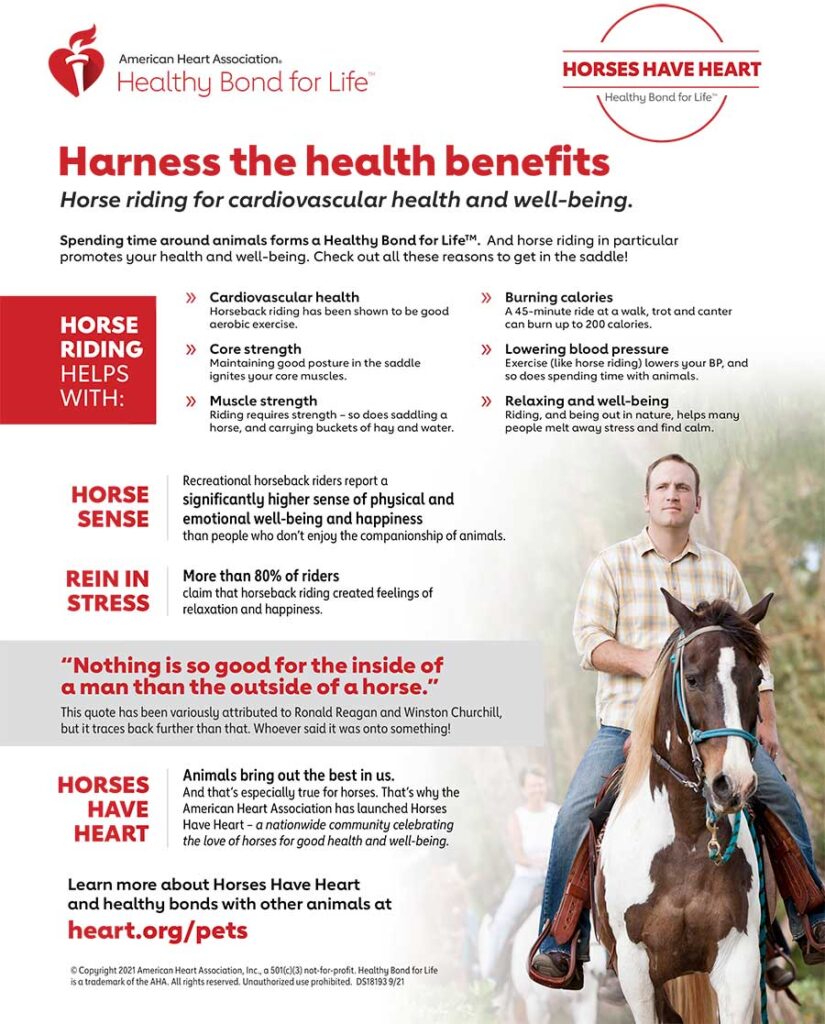
5. Horseback Riding as a Form of Exercise
In addition to the specific physical and therapeutic benefits, horseback riding is a fantastic form of exercise. Let’s explore some of the ways horseback riding can contribute to your overall physical fitness.
5.1 Calorie Burning and Weight Management
Horseback riding can be a surprisingly effective calorie-burning activity. Depending on the intensity and duration of your ride, you can burn a significant number of calories. Regular riding can help with weight management and contribute to a healthy body composition.
5.2 Improvement in Posture and Alignment
Maintaining proper posture and alignment is crucial for effective riding. When you ride, you learn to engage your core and align your spine, which can promote better posture and alignment in your daily life. By consistently practicing correct riding posture, you can improve your overall posture and prevent common postural issues.
5.3 Increases Body Awareness
Riding a horse requires a high level of body awareness. You have to be aware of your body position, balance, and the subtle cues your body gives to the horse. Over time, this increased body awareness can carry over into other areas of your life, making you more conscious of how you move and carry yourself.
5.4 Improves Overall Physical Fitness
Horseback riding engages a variety of muscle groups, including the core, legs, back, and arms. The constant adjustments and movements required during riding provide a full-body workout. This can lead to improved muscular strength, endurance, and overall physical fitness.
6. Building Trust and Communication with Horses
An essential aspect of horseback riding is building trust and effective communication with the horse. Let’s explore how interacting with horses can enhance these important skills.
6.1 Developing a Bond with the Horse
Building a bond with a horse is a unique and rewarding experience. It requires time, effort, and patience. Through regular interaction, grooming, and riding, you can develop a deep connection with your horse. This bond fosters trust and strengthens the relationship between you and the horse.
6.2 Non-Verbal Communication
Horses primarily communicate through non-verbal cues and body language. When you work with horses, you learn to interpret their cues and respond accordingly. This enhances your ability to communicate non-verbally and effectively read the body language of others, leading to improved interpersonal communication skills.
6.3 Learning Empathy and Patience
Interacting with horses teaches you the importance of empathy and patience. Horses can sense your emotions and respond accordingly, making it crucial to approach them with understanding and compassion. As you develop empathy and patience with horses, you can transfer these qualities to your relationships with humans as well.
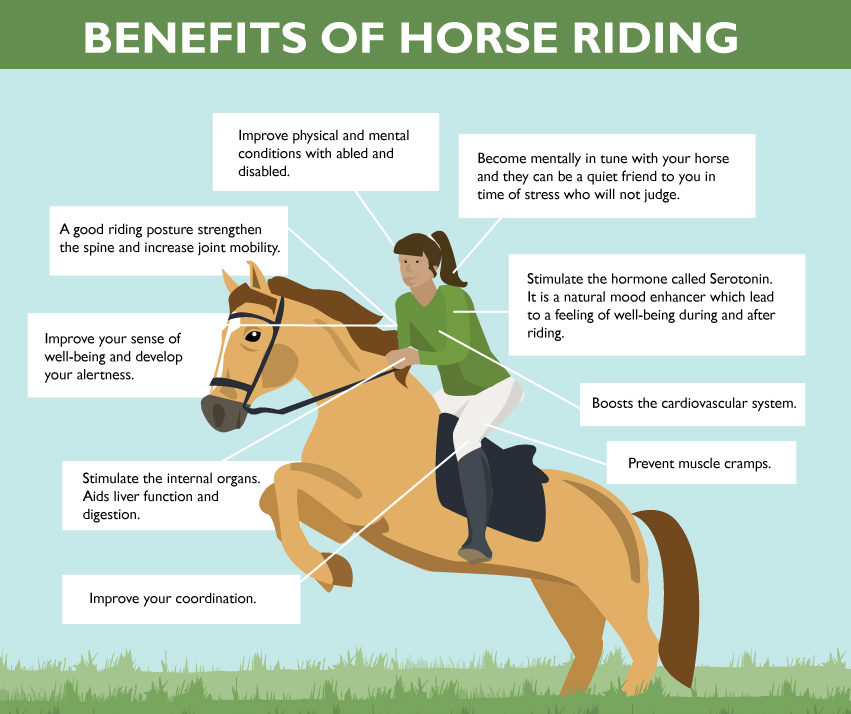
7. Overcoming Fear and Building Resilience
Horseback riding can be an opportunity to face and overcome fears, ultimately building resilience and perseverance. Let’s explore how horseback riding can help you conquer fear and develop emotional strength.
7.1 Conquering Fear and Anxiety
For many people, horseback riding can initially spark fear and anxiety. However, by gradually building trust with the horse and developing riding skills, you can overcome these fears and gain a sense of accomplishment. Riding becomes a platform to conquer fear and build resilience in other areas of life.
7.2 Developing Resilience and Perseverance
Horseback riding requires perseverance and resilience. It is a challenging activity that involves mastering new skills and overcoming obstacles. Riding teaches you to remain resilient in the face of difficulties, helping you develop greater mental strength and perseverance.
7.3 Building Emotional Strength and Coping Skills
Interacting with horses and facing the challenges of riding can build emotional strength and coping skills. Horses are perceptive animals, and they can mirror your emotions. By managing your emotions and remaining calm in challenging situations, you can build emotional resilience and develop effective coping strategies.
8. Equine Therapy for Mental Health
Horseback riding has gained recognition as an effective form of therapy for various mental health conditions. Let’s explore some specific applications of equine therapy.
8.1 Equine-Facilitated Psychotherapy
Equine-facilitated psychotherapy involves working with horses as part of a therapeutic process. This form of therapy combines traditional talk therapy techniques with horse-related activities, such as grooming and riding. Equine-facilitated psychotherapy can help individuals explore and process emotions, improve self-awareness, and develop valuable coping skills.
8.2 Horseback Riding for Stress Management
Horseback riding is an excellent activity for stress management. The repetitive movements of riding, coupled with the calming presence of the horse, can help reduce stress levels and promote relaxation. Engaging in horseback riding regularly can serve as a valuable coping mechanism for managing day-to-day stress.
8.3 Equine-Facilitated Learning and Personal Growth
Equine-facilitated learning focuses on personal growth and development through horse-related activities. It provides experiential learning opportunities for individuals to develop life skills such as leadership, communication, problem-solving, and teamwork. Working with horses in a guided setting can facilitate personal growth and enhance self-awareness.
8.4 Equestrian Activities for Children with Behavioral Issues
Horseback riding and other equestrian activities can be highly beneficial for children with behavioral issues. The structured nature of riding lessons and interactions with horses can help improve self-control, impulse management, and social skills. Engaging in equestrian activities can provide a therapeutic outlet for children, allowing them to develop positive behaviors and self-discipline.
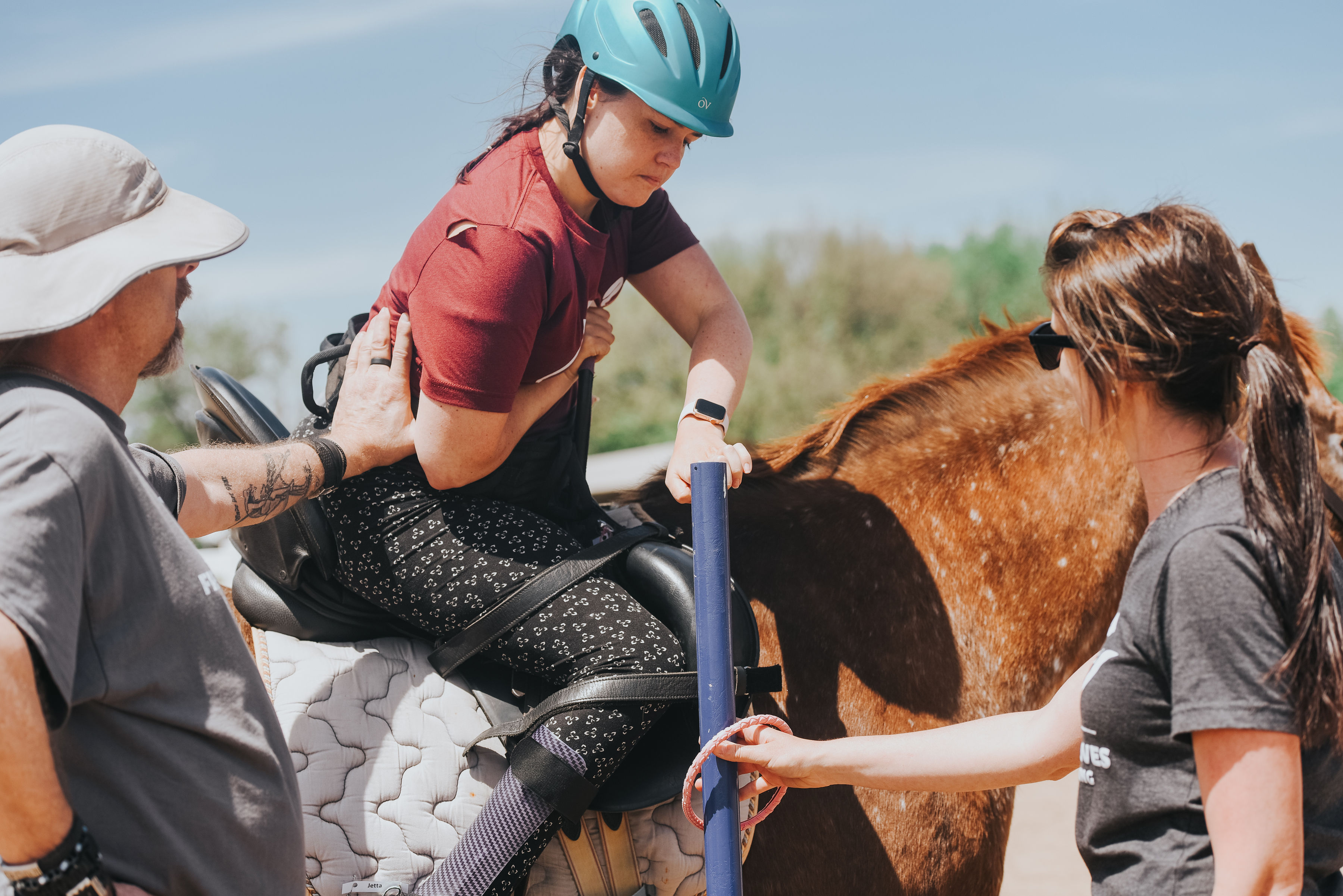
9. Mindfulness and Connection with Nature
Horseback riding offers a unique opportunity to practice mindfulness and connect with nature. Let’s explore how horseback riding can enhance these aspects of your well-being.
9.1 Enhancing Mindfulness and Presence
Horseback riding requires you to be fully present and engage all your senses. The experience of riding demands focus, attention, and awareness of your body, the horse, and your surroundings. This heightened state of mindfulness can be deeply rewarding and provide a break from the distractions of daily life.
9.2 Connecting with Nature and Animals
Being around horses and riding in nature allows you to connect with the natural world. The sights, sounds, and smells of the outdoors, combined with the presence of horses, can create a profound sense of connection. This connection with nature and animals can instill a feeling of calm and harmony.
9.3 Cultivating Appreciation and Gratitude
Horseback riding often takes place in picturesque settings, whether it’s in the countryside, on trails, or in an arena. This exposure to nature’s beauty can cultivate a greater appreciation for the natural world and instill a sense of gratitude. Riding provides an opportunity to slow down, embrace the present moment, and savor the beauty of the surroundings.
10. Engaging in a Fulfilling Hobby and Recreation
Beyond its physical and therapeutic benefits, horseback riding is also a fulfilling hobby and recreational activity. Let’s explore how horseback riding can offer enjoyment and opportunities for personal growth.
10.1 Enjoyment and Recreation
Horseback riding is an enjoyable and fun activity that can bring immense pleasure. The bond formed with your horse, the freedom of galloping through open fields, and the sense of adventure all contribute to the enjoyment and fulfillment derived from horseback riding. It offers a form of recreation that combines physical activity, nature, and the companionship of horses.
10.2 Connecting with a Community of Horse Lovers
Engaging in horseback riding opens the door to a vibrant community of horse lovers. Whether it’s through local riding schools, equestrian events, or online forums, you can connect with like-minded individuals who share your passion for horses. This community provides opportunities for friendships, support, and shared experiences.
10.3 Setting Goals and Achieving Success
Horseback riding allows you to set and pursue personal goals. Whether you aim to learn a specific riding technique, participate in a competition, or embark on a long-distance trail ride, these goals provide a sense of purpose and motivation. Working towards and achieving these goals can boost your self-confidence and provide a sense of accomplishment.
In conclusion, horseback riding offers a plethora of physical, emotional, psychological, and therapeutic benefits. From improving balance and coordination to boosting self-confidence and fostering empathy, horseback riding has the potential to positively impact various aspects of your life. So, whether you’re a seasoned rider or a beginner, consider incorporating horseback riding into your life to experience the numerous benefits it has to offer.
Now, let’s address some common questions about horseback riding.
1. Is horseback riding a good form of exercise?
Yes, horseback riding is a great form of exercise. It engages a variety of muscle groups, improves cardiovascular fitness, and helps with weight management. Additionally, it enhances balance, coordination, and flexibility.
2. Can horseback riding help with stress relief?
Absolutely! Horseback riding can significantly reduce stress levels. The calming presence of horses and the rhythmic motion of riding can promote relaxation and provide a break from daily stressors.
3. Is horseback riding suitable for individuals with disabilities?
Yes, horseback riding can be highly beneficial for individuals with disabilities. Therapeutic riding programs, such as hippotherapy, offer unique opportunities for physical, cognitive, and emotional development.
4. Can horseback riding improve self-confidence?
Definitely! Riding and working with horses can help boost self-confidence. The sense of achievement and connection developed during the process can have a positive impact on overall self-esteem.
5. How can horseback riding help individuals with trauma or PTSD?
Equine-assisted therapy, which involves interacting with horses, can be particularly beneficial for individuals with trauma or PTSD. Spending time with horses and engaging in horse-related activities can create a safe and calming environment for emotional healing and processing.
6. Does horseback riding require a strong bond with the horse?
Building a bond with the horse is essential for successful horseback riding. Developing trust and effective communication with the horse not only enhances the riding experience but also contributes to the overall well-being of both rider and horse.
7. Can horseback riding help overcome fear and anxiety?
Certainly! By gradually building trust and developing riding skills, individuals can conquer fear and anxiety associated with horseback riding. Overcoming these challenges can also translate into increased emotional strength and resilience in other areas of life.
8. What is the connection between horseback riding and mindfulness?
Horseback riding requires individuals to be fully present and engaged in the moment. The mindful aspects of riding, such as focusing on body movements and the horse’s cues, can enhance mindfulness and promote a deeper mind-body connection.
9. How can horseback riding benefit individuals with mental health conditions?
Horseback riding, as part of equine therapy, can offer valuable support for individuals with mental health conditions. Activities such as equine-facilitated psychotherapy and horseback riding for stress management can help improve self-awareness, coping skills, and overall well-being.
10. Is horseback riding an enjoyable hobby?
Absolutely! Horseback riding is not only physically and emotionally beneficial, but it is also a fulfilling hobby that provides enjoyment and recreational opportunities. The thrill of riding and the connection with horses create a unique and fulfilling experience.
Remember, whether you’re seeking physical fitness, emotional well-being, therapeutic support, or simply a fulfilling hobby, horseback riding has much to offer. So saddle up and embark on an incredible journey of physical and emotional growth with these remarkable creatures.
